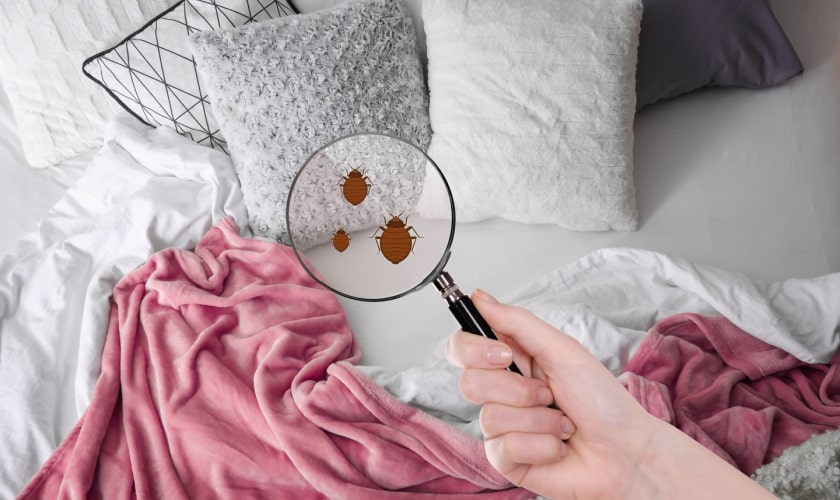A Failure of the Different Types of Insect Control Solutions
In the realm of insect control, a wide variety of techniques exist to deal with the visibility and resolve of undesirable animals. From the traditional usage of chemical pesticides to much more ingenious biological control solutions, each method provides distinct benefits and restrictions. As we navigate via the varied landscape of bug control remedies, recognizing the details of each approach ends up being critical in identifying one of the most reliable training course of activity. Remain tuned as we explore the nuanced globe of bug control methods and discover just how each kind plays an one-of-a-kind duty in safeguarding our environments.
Chemical Pesticides
Chemical pesticides are commonly utilized in pest control to successfully eliminate a wide variety of bugs and various other insects. These pesticides work by targeting the nerve system of the insects, interrupting their normal functions, and inevitably resulting in their death. Making use of chemical pesticides has actually been a staple in the bug control market for decades because of their performance and quick results.

However, it is necessary to use chemical pesticides with care as a result of their prospective damaging effects on the setting and non-target varieties. Incorrect application or overuse of these pesticides can lead to air pollution, damage to advantageous pests, and resistance advancement in insect populaces. It is vital to follow safety and security guidelines and policies when making use of chemical pesticides for pest control.
Biological Control Techniques
Taking into consideration the potential environmental effects and risks connected with chemical pesticides, organic control approaches provide a more lasting strategy to managing insect populaces. Organic control involves the use of all-natural adversaries, such as pathogens, parasites, and predators, to suppress bug populations. This approach is often much more targeted, impacting only the particular bug types while decreasing harm to advantageous bugs, people, and the atmosphere.

One advantage of organic control is its long-term efficiency. Once developed, all-natural opponents can aid manage pest populaces constantly without the demand for repeated applications of chemicals. Additionally, biological control is often a lot more cost-effective and can help in reducing chemical resistance in parasite populations with time. In general, organic control methods use a lasting and eco-friendly remedy to pest management.

Mechanical Bug Control
Mechanical insect control includes the physical manipulation or elimination of insects to handle their populaces efficiently. One usual official source instance of mechanical insect control is using catches to capture bugs or rats.
One more mechanical method is using obstacles such as fencings, screens, or webs to obstruct bugs from entering specific locations. By physically protecting against bugs from accessing a location, the probability of invasions or damages can be substantially reduced. In addition, manual approaches like handpicking insects off plants or structures can be effective for smaller-scale invasions.
While mechanical pest control approaches can be labor-intensive, they offer a non-chemical option that can be sustainable and ecologically pleasant. By targeting insects straight, mechanical control techniques can assist keep insect populaces in check without relying upon pesticides.
All-natural Remedies
Using all-natural remedies for bug control supplies a sustainable and environmentally friendly strategy to managing bug populaces without resorting to chemical interventions. Natural treatments entail utilizing compounds derived from plants, minerals, or other naturally occurring sources to prevent or get rid of pests. For instance, planting particular natural herbs like basil, mint, or lavender around your residential or commercial property can push back pests because of their solid aromas. Diatomaceous earth, a powder made from fossilized algae, can be used to battle pests like ants, cockroaches, and bed bugs by dehydrating their exoskeletons.
In addition, necessary oils such as tea tree oil or neem oil have insecticidal buildings that can properly manage insects while being safe for the setting. One more all-natural treatment is introducing valuable bugs like ladybugs or praying mantises to your yard to exploit dangerous insects. By incorporating these all-natural services right into insect monitoring methods, individuals can websites minimize their reliance on artificial chemicals and promote a much healthier, more well balanced community.
Integrated Parasite Management
Integrated Parasite Management (IPM) is a thorough method that incorporates various methods to effectively manage pest populaces while reducing threats to human health and the setting. IPM involves the combination of numerous pest control techniques such as organic control, habitat control, alteration of cultural methods, and making use of resistant crop ranges. By making use of a combination of these techniques, IPM intends to lower reliance on chemical pesticides, which can have unfavorable influence on ecological communities and human health.
One secret element of IPM is the focus on avoidance. By executing procedures to stop pest infestations before they happen, such as keeping correct sanitation and sealing entry points, the requirement for responsive parasite control actions is minimized. Monitoring and regular assessments play a critical role in IPM, allowing for early detection of pest issues and prompt intervention.
Conclusion
In conclusion, the various kinds of bug control services offer a variety of options for properly handling insect problems. Organic control techniques make use of all-natural predators to regulate pests. Integrated Parasite Administration integrates multiple strategies for an alternative method to pest control.
Chemical pesticides are generally utilized in pest control to efficiently get rid of a wide array of bugs and other parasites.Mechanical pest control includes the physical manipulation or elimination of parasites to handle their populaces effectively (Kings cincinnati pest control companies).Using all-natural solutions for parasite control uses a sustainable and green method to handling parasite populaces without resorting to chemical treatments.Integrated Insect Monitoring (IPM) is a comprehensive method that combines various strategies to successfully control pest populaces while reducing risks to human wellness and the setting.In verdict, the different kinds of pest control solutions provide a you can look here variety of options for efficiently taking care of pest problems